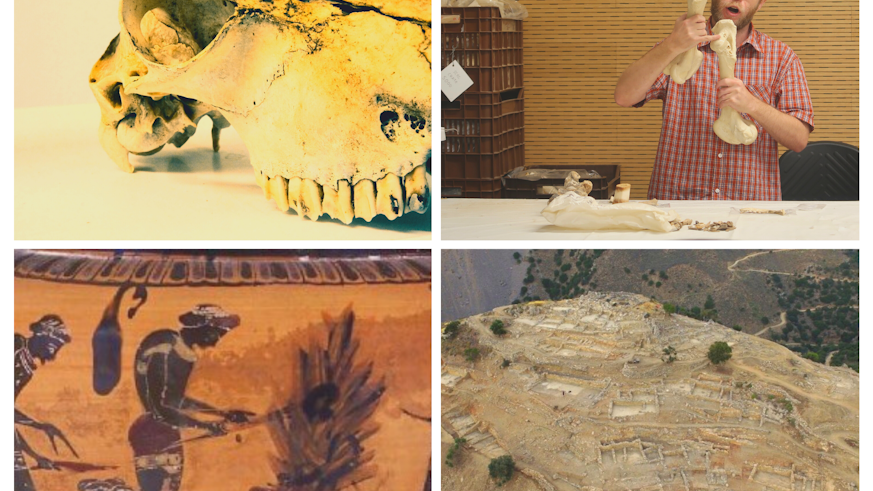How archaeology is revealing the economies supporting feasting in the ancient world
2 August 2022

Cardiff archaeology applies acclaimed bioarchaeological expertise to ancient Greek city-states and identity
Research by Cardiff bioarchaeologists is taking the first ever multi-scalar study of animals and feasts in the first millennium BCE, focusing on the well-studied and self-contained island of Crete.
From animals herded in the landscape to large-scale sacrificial feasts, animals were a central component to the development and resilience of citizen-states in this ancient period.
The Zooarchaeology of Historical Crete: A Multiscalar Approach to Animals in Ancient Greece - commonly known as ZOOCRETE - is unique in its approach to the zooarchaeology of historical period Greece, representing both the first large-scale synthesis of the evidence for animals in this period and region, as well as spanning the development of several citizen-states.
By adopting an interdisciplinary approach to the evidence for animals on Crete and in ancient Greece more broadly, it aims to understand better the socioenvironmental organization of group feasts that underpinned civic identity.
While isotope analysis of ancient human remains is well established, the application of these revelatory methods is a rapidly emerging field in the zooarchaeological record.
In ZooCrete, researcher Dr Flint Dibble is examining skeletal, biomolecular, and textual evidence to produce a fresh narrative of these citizen-states. The project investigates the role of feasts in establishing communal identity, explores the interconnections between the political economy and the natural environment, and compares and contrasts the evidence for animals in the ancient Greek archaeological and textual records.
The two-year project is exploring animal skeletal evidence from recently excavated sites, creating the first large-scale multi-site isotope analysis of faunal remains from the historical ancient Greek world and adopting a complementary digital humanities analysis to animals in ancient Greek literature.
Conducting this ambitious study, archaeologists aim to:
- reveal the ways in which foodways were used by local communities to craft cohesive identities and regulate social hierarchies
- ascertain provisioning and seasonality, in order to understand landscape impact of animal rearing and the true mobility of society
- evaluate the relationship between the zooarchaeological and textual records, offering interdisciplinary conclusions relevant to foodways studies in the Greek world and beyond
Significantly, the project progresses new directions in archaeology, investigating little studied faunal evidence of ancient feasts to offer animal production for large-scale civic gatherings as markers of the resilience of city state systems.
It covers an entire millenium from the early state-sourced large-scale animal sacrifice during the Geometric period (approximately 750BC) to the commercial butchery and civic feasting in Hellenistic cities on Crete.
ZOOCRETE builds on the well-documented significance of feasting revealed in classical archaeology, textual sources and iconography to elaborate on patterns of ritualised dining and the significant resources required to support the monumental venues celebrated today.
Combining archaeology and texts through bespoke digital humanities methods, this interdisciplinary approach bridges the fields of archaeological science, classical archaeology and history, feeding into the university’s Mediterranean Archaeology and Ancient History research groups.
This new study represents an innovative approach to analysing the formation of new communities and their relationships to the natural environment by actively combining new scientific analyses with Dr Dibble’s recently completed zooarchaeological research, undertaken in collaboration with several international archaeological projects.
Commenced in September 2021, The Zooarchaeology of Historical Crete: A Multiscalar Approach to Animals in Ancient Greece is funded thanks to a Marie Skłodowska-Curie Actions Individual Fellowship, awarded from the European Commission (grant number 101026314). Follow #ZOOCRETE for latest project findings.
Researcher Dr Flint Dibble focuses on foodways in ancient Greece, with research touching on urbanism, climate change, religious ritual, and everyday life.
